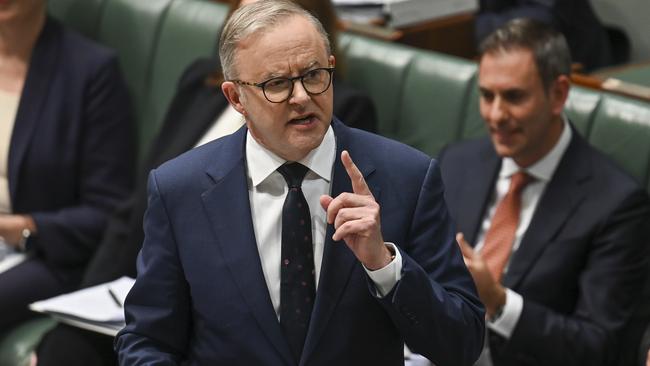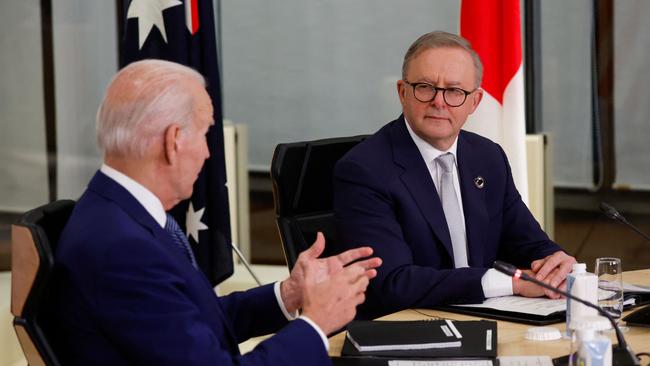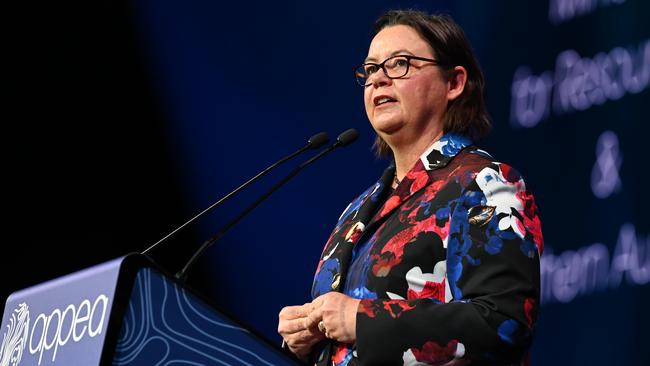Australia becoming ‘domestic source’ to US Defence doesn’t include clean energy package
Australia’s renewable superpower ambitions were supposed to be turbocharged by Joe Biden’s clean energy pact. But all is not what it seems.
National
Don't miss out on the headlines from National. Followed categories will be added to My News.
Anthony Albanese’s deal with Joe Biden on a US law change will not give Australian companies access to the President’s signature $US369bn clean energy package, despite the Prime Minister’s claims to the contrary.
After their weekend meeting in Japan, the leaders announced Mr Biden would ask the US Congress to add Australia as a “domestic source” in the US Defence Production Act.
On Monday, Mr Albanese told parliament the move was “critical because treating Australia as a domestic supplier will allow our industries to benefit from the Inflation Reduction Act”, which passed last year and featured Mr Biden’s mammoth clean energy investment.

But it can be revealed that the US Department of Defence had already sought to include Australia in the Cold War-era Defence Production Act last month in a proposal that made no mention of the Inflation Reduction Act.
The Pentagon also asked Congress to make the same change last year – before the Inflation Reduction Act passed – and while it was ticked off by the House of Representatives, it was rejected in the Senate.
Australian clean energy businesses had rushed to welcome Mr Albanese’s announcement, given the Inflation Reduction Act’s generous subsidies, tax credits and loans for net zero projects including on critical minerals, hydrogen and battery technologies.
“That is worth $A547bn,” the Prime Minister told parliament on Monday.
“That means big opportunities for Australia to build our renewable energy industry and create jobs, including in the hydrogen sector, to boost manufacturing to support emerging industries. The only other country in the world with this designation is Canada.”

But Canada is not referenced in the Inflation Reduction Act. Instead, it is a “domestic source” in the Defence Production Act, giving it access to incentives authorised by the president and capped at $US750m a year for nationally important industrial projects.
The Pentagon, in asking Congress for Australia to be added as a “domestic source”, said the existing law unnecessarily constrained authorities from ensuring “a robust industrial base”.
It said Australia needed to be included so the US government could “leverage the resources of its closest allies to enrich US manufacturing and industrial base capabilities and increase the nation’s advantage in an environment of great competition”.
Mr Albanese’s office did not respond to questions on Tuesday.
Australia’s access to the Inflation Reduction Act was also not explained in a joint statement released on the weekend by Mr Biden and Mr Albanese.
It said Australia’s inclusion in the Defence Production Act would “streamline technological and industrial base collaboration, accelerate and strengthen AUKUS implementation, and build new opportunities for United States investment in the production and purchase of Australian critical minerals, critical technologies, and other strategic sectors”.

Resources Minister Madeleine King appeared to contradict Mr Albanese’s comments in the Australian Financial Review on Tuesday, suggesting Australia could secure “US capital and benefit from the Inflation Reduction Act” as part of a separate US-Australia climate pact.
She said the Defence Production Act listing was “in addition” to the climate compact, and explained it would “allow the US president to direct incentives including loans and purchase commitments” to Australian businesses.
Ashley Townsend, a senior fellow for Indo-Pacific security at the Carnegie Endowment, added that Australia’s Defence Production Act listing was “hardly going to move the needle” on AUKUS and was “no silver bullet” to barriers posed by US arms trafficking regulations.
More Coverage
Originally published as Australia becoming ‘domestic source’ to US Defence doesn’t include clean energy package





